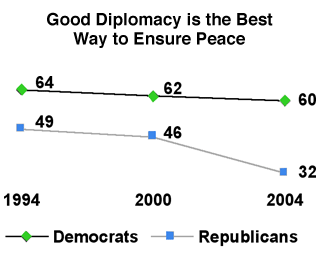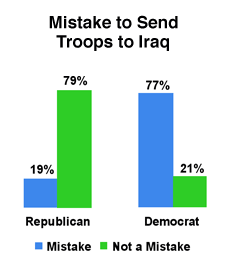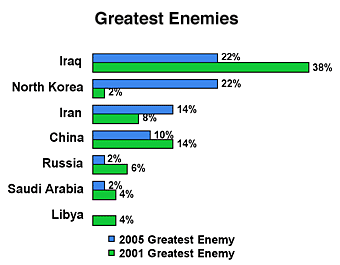|
More Partisanship in a
Period of Foreign Policy Ascendance
By Floyd Ciruli
March 2005
The world must be made safe for democracy, W. Wilson 1917
And because democracies respect their own people and their neighbors the advance of freedom will lead to peace, G.W. Bush 2005
The topic of foreign policy has seldom dominated American political dialogue as it does today. Typically, Americans are focused on homegrown problems and only rarely rate foreign issues a top concern. In fact, from the end of the Cold War in 1991 through the decade preceding 9/11, Americans were aggressively parochial and intently focused on internal issues. But the attacks on New York and Washington D.C. ushered in a new era in which terrorism, homeland security and the war in Iraq overtook American domestic politics.
Foreign policy concerns dominated the intense 2004 presidential campaign and as they have lingered, the debate has turned more partisan. Not since the late stages of the Vietnam War (early 1970s) have Americans been as polarized in their views on how to handle foreign affairs.
Although foreign affairs eventually will recede as the perceived terror threat and daily news from Iraq diminish, America’s worldwide military preeminence and the globalization of threats may maintain the American public’s awareness of and interest in world affairs and make foreign policy a regular staple in domestic politics.
An analysis of a series of recent national public opinion polls highlights Americans’ new interest in foreign affairs and the strong partisan divide about them.
Foreign Policy Highlights
- Foreign policy is a dominant concern among a majority of Americans – more so among Republicans than Democrats.
- There is little partisan agreement on major issues such as the Iraq war; and differences over the best approach to foreign affairs have increased.
- The increased polarization has not increased isolationism. Americans back a leading role for the country in world affairs.
- Although Americans continue to support multilateral solutions, respect for the United Nations has declined.
- After a period of tension, America’s image of France and Germany has improved, Japan has gained significantly in Americans’ esteem.
- Iraq, North Korea and Iran head the list of threats to America. The public perception of China, Russia and Libya as enemies has declined.
- Americans see positive signs in the Palestinian-Israeli relations are more hopeful that a peaceful solution is possible in the Middle East.
Rise of Foreign Policy Issues
Historically, foreign policy issues do not dominate Americans’ concerns. With the exception of immediately after a foreign crisis, Americans seldom consider non-domestic issues critical or a decisive factor when voting for president.1 In the 2000 presidential election, foreign policy or world affairs explained only about 12 percent of the vote for president. Whereas the 2004 exit polls showed that 34 percent of the vote for President George W. Bush or Senator John Kerry could be explained by either Iraq or terrorism.2
The latest 2005 national Gallup poll confirms that domestic issues currently follow war and terror among the highest priorities. Health care costs, education, the economy and social security were clustered close together in people’s views as extremely important issues to be addressed by the national government, but only after terrorism and war.
|
Extremely Important for Congress and
President to Address
|
| Issue |
All |
Republican |
Democrat |
| Terrorism |
54% |
63% |
42% |
| Iraq |
53% |
56% |
51% |
| Healthcare cost |
49% |
41% |
55% |
| Education |
45% |
39% |
52% |
| Economy |
44% |
40% |
48% |
| Social Security |
41% |
40% |
4% |
|
Gallup 20053
|
Question: How important is it to you that the president and Congress deal with each of the following in the next year -- is it extremely important, very important, moderately important, or not that important? How about:
Partisan differences are evident in Americans’ ranking of priorities. More than half of Republicans rank terrorism and Iraq as top priorities, but Democrats rank health care cost and education as highest.
Partisanship and Foreign Policy
Americans’ partisan preference is closely divided between Democrats and Republicans, which marks a significant improvement for Republicans during the last decade.4 And partisanship is now more closely associated with fundamentally different views on foreign policy. For example, Republicans are far more supportive of military strength as the best way to achieve peace, versus Democrats who prefer diplomacy. Although Democrats historically are more supportive of diplomacy, after 9/11 the difference increased by 14 percentage points since 2000.

Pew Research Center 20045
Recent analysis from the Pew Research Center shows that the key predictor as to whether a person is a Republican is belief that the use of force is the best strategy to ensure peace, whereas the efficacy of diplomacy is the strongest predictor of Democrats (foreign policy is twice as important as economic or social values).
Significant partisan differences continue today — months after the presidential election heightened debate over the war in Iraq. Shortly after the well-received Iraq elections in late January 2005, 51 percent of Americans believed the Iraq war was justified and 47 percent felt it was a mistake. But Democrats and Republicans are a mirror image in their evaluation of the war. Three quarters of Republicans believe it is not a mistake and three quarters of Democrats believe it is a mistake.

Gallup 20056
Question: In view of the developments since we first sent our troops to Iraq, do you think the United States made a mistake in sending troops to Iraq or not?
Role of America in World Affairs
President Bush is leading an aggressive and controversial foreign policy. But neither partisan bickering nor a difficult war have turned Americans isolationist. Even though a majority of Americans believe the country and President Bush lack respect in the world, they believe the United States should play a leading role in world affairs.
|
Perception of United States
and Role in World Affairs
|
| Position On American Role |
Agree |
| Take leading or major role in the world |
71% |
| Bush not respected by other country leaders |
60% |
| U.S. seen unfavorably in the world |
51% |
Gallup 20057
|
Multilateralism
Americans maintain their preference for multilateral solutions to world problems, although they’ve lost respect for the United Nations.8 For example, two-thirds (64%) of Americans say the United Nations "plays a necessary role in the world today” although they believe the UN is doing a poor job (61% poor job, Gallup 2005). In general, views on both the UN’s performance and the importance of its role in the world have declined in recent years. Disagreements between the United States and UN on the war in Iraq, the UN’s reluctance to aid the reconstruction and the scandal surrounding the Oil for Food program have lowered respect for the UN with vast segments of the American public.
As in other policy areas, there is a substantial partisan difference in attitudes towards the UN. Democrats are much more likely to have a favorable view of the UN (60% of Democrats are favorable and only 25% of Republicans, Gallup 2005). Also, Democrats are more likely to believe the UN plays a necessary role in “world affairs” (Democrats 74% necessary role vs. only 52% among Republicans, Gallup 2005).
Axis of Weasels
Americans view of their historic Western European allies, the French and the Germans, has improved since the days immediately following the start of the Iraq war.9 Currently, a slight majority view France favorably and 73 percent have a positive view of Germany. Although Germany and France were high profile partners in opposing the Iraq War, Americans were never as angry with Germany as they were with France. (Only 34% saw France favorably in 2003 vs. 49% favorability for Germany, Gallup 2005.)
|
Opinion of France and Germany
|
| |
Favorable |
Unfavorable |
| |
2003 |
2005 |
2003 |
2005 |
| France |
34% |
51% |
64% |
43% |
| Germany |
49% |
73% |
44% |
22% |
|
Gallup 200510
|
Question: Next, I’d like your overall opinion of some foreign countries. First, is your overall opinion of [RANDOM ORDER] very favorable, mostly favorable, mostly unfavorable, or very unfavorable? How about --
In overall popularity, France and Germany are not Americans’ favorite allies. Great Britain (91% favorable), Canada (86% favorable), Japan (81% favorable), Poland (78% favorable), India (75% favorable) and Mexico (74% favorable) all rank higher in American esteem.
Japan’s 81 percent favorable rating is a significant increase in recent years. It reflects the decline in trade rivalry and Japan’s support for Iraq reconstruction, a defense shield and six party talks on the Korean peninsula.
Greatest Enemies
President Bush’s labeling of Iraq, Iran and North Korea as the Axis of Evil had its impact on Americans’ opinion of its “enemy list”.11 North Korea is now tied for first place, moving from 2 percent in 2001, to 22 percent in 2005, tied with Iraq. Iran is in third position on the list of nations that Americans consider the country’s greatest enemies.

Gallup 200512
Question: What one country anywhere in the world do you consider to be America’s greatest enemy today?
Iraq has moved down the list of enemies from 2001 after major combat operations ended and reconstruction began. With the focus on terrorist sponsoring states and access to weapons of mass destruction, China and Russia have declined in America’s perception as enemies. Although Libya is still under dictatorship, it was mentioned as an enemy by less than 1 percent in 2005.
Middle East
Finally, the latest Gallup polls show Israel’s favorability rating has risen (69% favorable) from a recent low of 54 percent favorable in 2000.13 The Palestinian Authority has a 27 percent favorability rating, also an improvement from a low of 15 percent one year ago.
|
Opinion of Middle East Nations
|
| Nation |
Favorable |
Unfavorable |
| Israel |
69% |
25% |
| Egypt |
64% |
26% |
| Jordan |
54% |
32% |
| Saudi Arabia |
36% |
58% |
| Iraq |
29% |
66% |
| Palistinian Authority |
27% |
62% |
| Syria |
25% |
60% |
| Iran |
12% |
82% |
|
Gallup 200514
|
Question: Next, I’d like your overall opinion of some foreign countries. First, is your overall opinion of [RANDOM ORDER] very favorable, mostly favorable, mostly unfavorable, or very unfavorable? How about --
The passing of Yasser Arafat, election of Mahmoud Abbas as the new head of the Palestinian Authority and mutual announcements from Abbas and Israel Prime Minister Ariel Sharon to end the violence and negotiate a solution have triggered a surge of positive feelings for both entities.
Although there is a slight increase in the level of optimism that the two peoples will be able to live in peace (49% can live in peace/48% cannot live in peace) Americans remain skeptical. Still they prefer Israel’s cause over the Palestinian’s by about three to one (18% Palestinian cause to 52% Israeli, Gallup 2005). The favorability ratings also showed Saudi Arabia is now approaching Syria as a nation viewed unfavorably by Americans.
It is not surprising that foreign affairs are salient given that this may be one of the most active and idealistic administrations in 100 years. Woodrow Wilson at the beginning of the Great War, Harry Truman at the beginning of the Cold War and now George W. Bush at the start of the war on terror each advanced democracy as the cure for a threatened and threatening world. And each put soft and hard power behind the effort. Today’s momentous events and swift changes appear to insist world affairs hold Americans’ attention.
This isn’t the topic the Administration had expected to dominate but world events have shaped policy and shifted public opinion. U.S. involvement in foreign affairs has a direct impact on Americans, how they live and what they are concerned about.
Floyd Ciruli is a Denver-based pollster and political analyst. See other materials at www.ciruli.com.
Notes
- Richard Sobel, The Impact of Public Opinion on US Foreign Policy Since Vietnam, Oxford University Press, 2001, pps 12-14.
- Presidential election exit polls, 2000 and 2004.
- Gallup survey of issue priorities for Congress and President, February 4-6, 2005 with 1010 national adults (95% confidence ± 3 percentage points).
- Compendium of Gallup surveys concerning party support during 2004 with 37,330 interviews published January 31, 2005.
- Pew Research Center for the People and the Press; Policies and Values in a 51%-48%
Nation, concerning post-election foreign policy views, December 1-16, 2000 national adults.
- CNN/USA Today/Gallup survey concerning Iraq war, February 25-27, 2005 with 1008 national adults (95% confidence ± 3 percentage points).
- Gallup survey of foreign policy issues, February 7-10, 2005 with 1,005 national adults (95% confidence ± 3 percentage points).
- Gallup survey of February 7-10, 2005 published February 25, 2005
- ibid published February 16, 2005.
- ibid
- ibid published February 23, 2005.
- ibid
- ibid published February 15, 2005.
Ciruli Associates • 1490 Lafayette St., Suite 208• Denver, CO 80218 • PH (303) 399-3173 • FAX (303) 399-3147.
[top] [archives] [home] [send this page to a friend]
|


